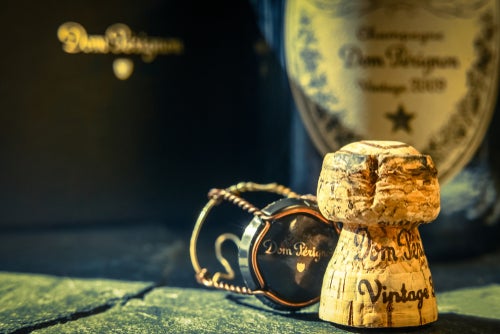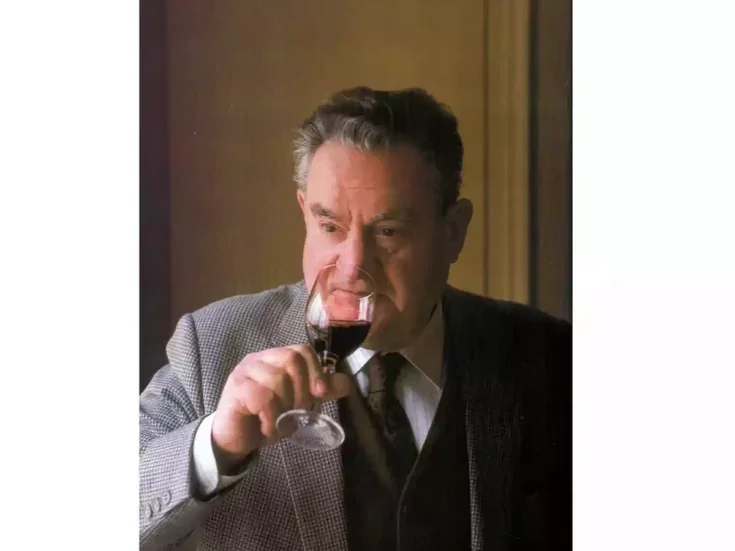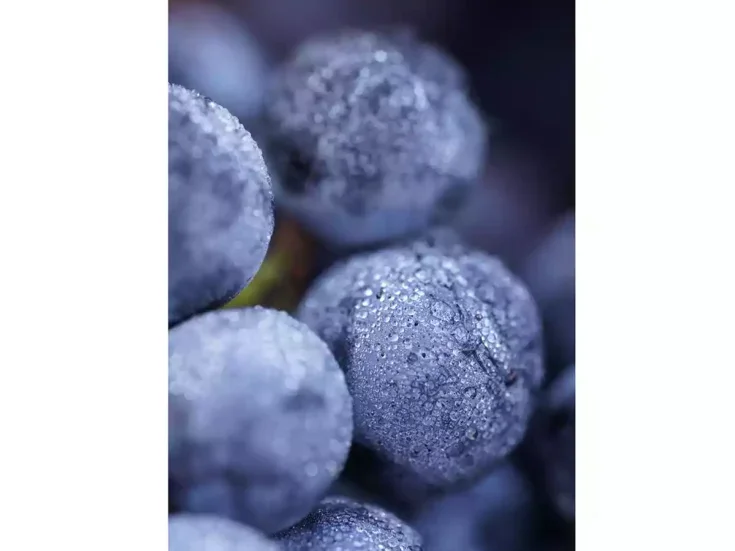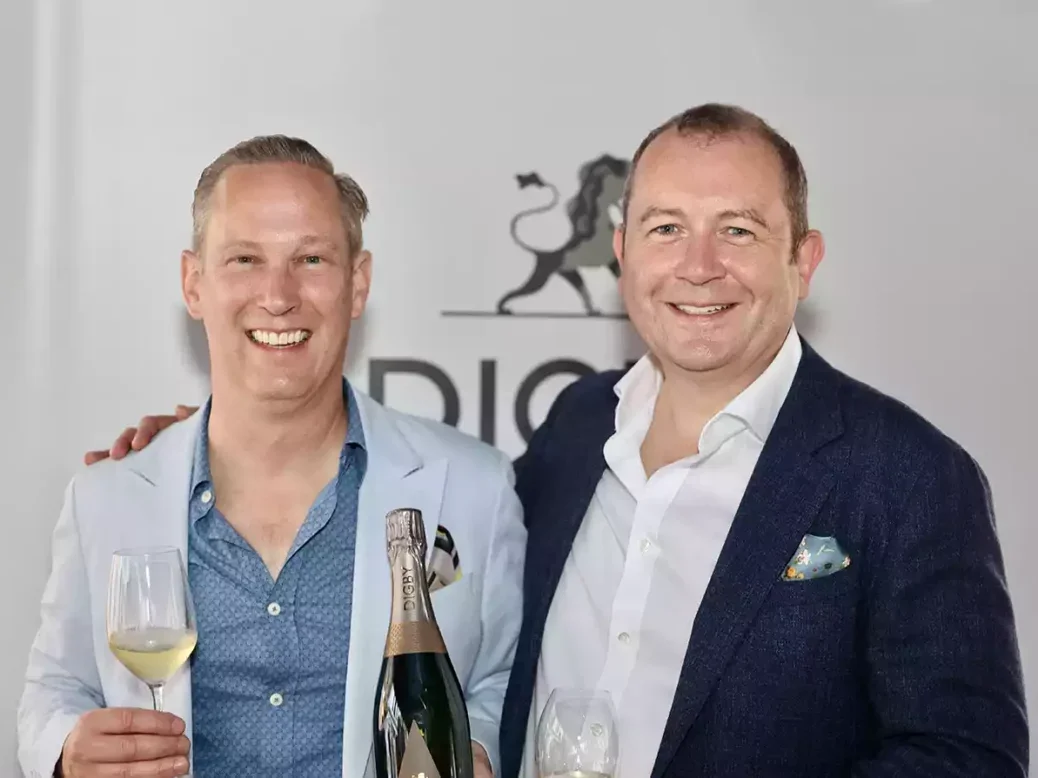
Trevor Clough and Jason Humphries have built a successful English sparkling wine brand with their take on the négociant model at Digby Fine English. Now, after buying a vineyard, they are ready for the next step, says Margaret Rand.
Greensand, how do I love thee? Let me count the ways.” Trevor Clough doesn’t actually channel Elizabeth Barrett Browning when talking about his favorite vineyard soil, but depth and breadth and height certainly come into it. Ideal grace? You bet. “I hold it close and build my wines around it,” he says: a lift-shaft structure with an umami undertone. Grapes from clay soils then give some flesh.
Blending is what Digby—or Digby Fine English, to use its full name—is all about. It’s an unusual model for English wine in that it’s not based on owning vineyards: the result of a eureka moment and some hard-nosed advice from California sparkling-wine makers. It’s a négociant brand that is now moving toward a bit of vineyard ownership and quite a bit more control over its sources. It has a smart tasting room in Arundel, West Sussex, and the owners are considering dipping a small toe into vineyard tourism. Will it get sucked into the familiar model of “We must have a restaurant/We must have a restaurant worthy of the brand/We must have a Michelin-starred restaurant”? Or will it be able to continue to invent its own furrow to plow?
To begin, as another poet said, at the beginning. And the beginning, you will be relieved to hear, is not Sir Kenelm Digby, or we’d be here all day. Sir Kenelm is a bit of appropriated history, the sort of things that lots of brands do, particularly new ones. Even Champagne brands do it. Among other things, Sir K invented the modern wine bottle, made of stronger glass than before; Clough has a replica, but he hasn’t got as far as using that shape for his wines.
Jason Humphries, Clough’s husband, rowed for his college (Trinity Hall) at Cambridge, as well as getting a PhD, DPhil, and MA in speech recognition and engineering—he was there nine years in all. He then worked in speech science, and in Boston, Massachusetts, he met Clough, who was in management consultancy, which he describes as “entrepreneurial boot camp.” School for Clough was Frankfurt International School, and university was Brown followed by an MBA at the London Business School. He worked at Oracle Corporation, which is a cloud technology company.
That work “gave me the greatest respect for any function of entrepreneurship,” says Clough. “In wine, you have to have a vision.” Humphries and he, having got together, began to think of what their legacy might be—as Clough puts it, “Are we making people happy? What are we leaving behind?”
Intuition, intention, and aspiring to excellence
It was not an automatic jump to wine. They liked wine and they drank it, but it tended to be related to places they’d been and who they’d been with: the evenings watching the sun set and talking about life. The wine and the sunsets and the friends “became part of the library of memories,” says Clough.
They wanted their own business, too, “something that would endure. We went on holiday and visited Domaine Ste Michelle—it’s a very small estate; nobody’s ever heard of it—and it was like a lightning bolt. I said, ‘English sparkling wine.’ Jason said, ‘What?’ and I said, ‘Exactly!’ Every scribe is as full of it as a cushion, and they’re right, and it’s a gem waiting to be discovered. We had never tasted English wine then.”
They came home, which by this time was England; this was the early 2000s. They embarked on a lot of blind tasting. “Some were already exceptional”—but some were not, and Clough and Humphries were clear that if they were going to do this, they were going to do it well. “We wanted to achieve excellence, and we knew how to soak up knowledge, so we knew what excellence was. My brain is structure-oriented, so I knew we would need vineyards, winemaking facilities, the business side, customers. I assumed we would start by planting a vineyard.” They also needed a mentor, so they went to California and called ten sparkling-wine makers. “Nine of them had meetings with us. They suggested that our intuition and intentions were good, but there were questions about the execution. ‘If you own a vineyard,’ they said, ‘you won’t know for many years if it’s any good. And great wines and okay grapes are not compatible.’ They said, ‘Where are the best vineyards in the UK?’ And we said, Nobody knows how to grade them. So, they said, ‘That’s your calling. Blending enables you to select the best vineyards. In mature wine regions, you’d be a négociant for volume reasons. In the UK, you’d do it for quality reasons.’ It was very good advice.”
They started with one grower, then two; then they built up to their current four or five, which includes one of those original two. “It’s part of the game for me, the joy and challenge,” says Clough of working with his growers. “We don’t want to have too many. If you add too many things [to a blend], you’ve lost your focus, lost your truth.” So, how do you make sure you have the right sites? “That can involve letting go,” he says, painful though that can be.
They learned by tasting everything: ripening fruit on the vines, juice off the press, young wine on the lees, mature wine on the lees, wine off the lees—everything. “Each of those views will give you a different understanding of how that wine will age. So, I’m able to talk about greensand compared to chalk,” says Clough.
But, he adds, he’s not a winemaker. The winemaker was Dermot Sugrue, who made wine at Wiston—because the second piece of advice those Californians gave, after “Don’t plant a vineyard,” was “Don’t build a winery. Don’t do anything. Great wine is made by a great winemaker.” They wanted one who would collaborate. Sugrue is undeniably a great winemaker, and Wiston, where he then was, did and does a lot of contract winemaking. The Californians also said, “You need somebody ideally for decades, because it will be a wild ride.”
Sugrue has now left Wiston to focus on his own wines, and since 2022 Digby has been made by Ben Smith at Itasca, a contract winemaker—a custom crush—in Hampshire. But only up to the point that the wine is bottled; after that point, all is done at Madehurst, at Artelium’s winery, where Sugrue now makes his wine. Dermot is still a consultant, “and he and I spend a lot of time with Ben on key decisions and blending, which is really my show,” says Clough. “I’ve given him a veto, and he’s used it twice—and I wished he hadn’t. We have very different brains, and that’s a source of strength. Ben has a very different brain again: He’s a scientist, and it’s process and numbers.”
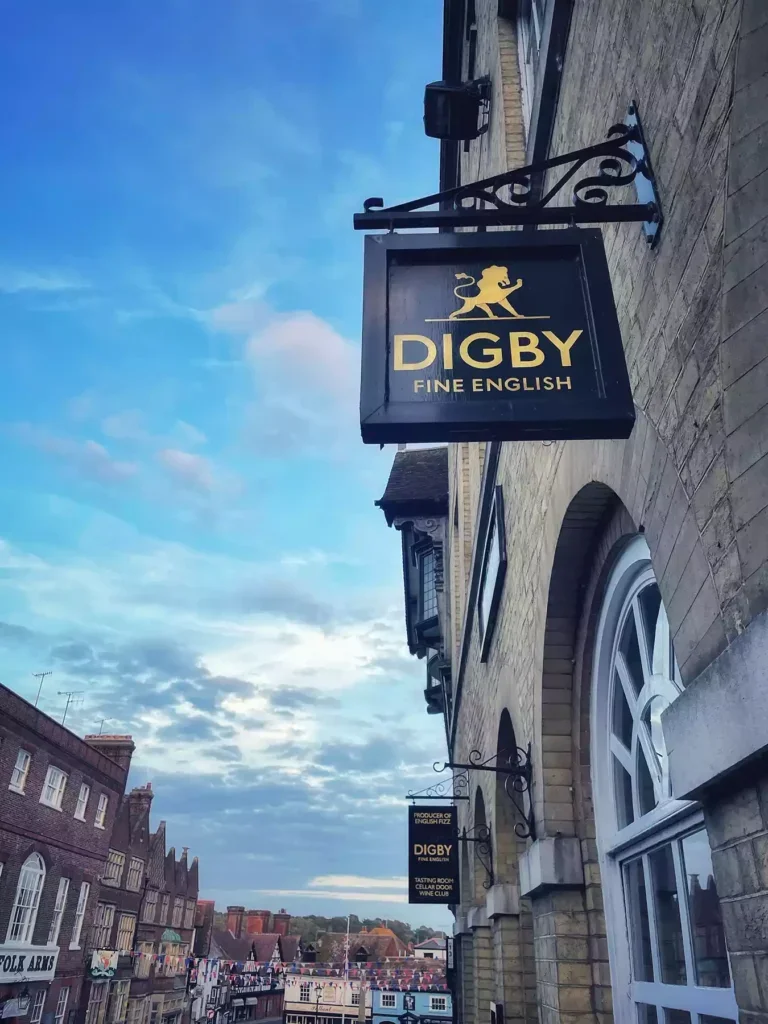
Digby Fine English: Greensand, clay, chalk, and Meunier
To backtrack for a moment, why would you go all the way to California for advice on setting up a wine company in England? Because California is really quite European, says Clough; and also because they were good at building something out of nothing, “and we admired their pluck.” And yes, they were warned it would be quite a ride, but “if anyone had said then we’d be aging on the lees for five to seven years, I’d have had a heart attack,” says Clough.
They launched in 2013, with the 2009. In 2020, during lockdown, Clough woke up in the middle of the night and said, “Forget about this. What next?”
What was next was to buy a vineyard. They’d always kind of known they would, just as they knew they would professionalize the business and take over more of the winery decisions. And now, they decided, it was time.
In 2021, they bought Hilden Vineyard. It had first been planted in 1978, but in 2015, its owner Philip Wright had bought it as a retirement project and replanted with the classic three sparkling varieties; in 2020, he doubled its size to 3ha (7.5 acres) and 10,500 vines, 42% Pinot Noir, 12% Meunier, and the rest Chardonnay. The fruit had always gone to Digby, but now the vineyard went to Digby, and Wright became chairman of Digby. “There’s something really special about that site,” says Clough. “If you’d asked me ten years ago [what kind of soil I wanted], I’d have said, chalk; and a year or two later, greensand. When you come from outside, you think chalk is everything,” he says later. But “so much of my craft is patience and listening to grapes”—and now greensand is the quality star for him.
Hilden, though, is on clay. There is also a second vineyard, just leased, which is on greensand but gives a different quality from their original greensand (grower-owned) vineyard; that has a linear, sharp-angled quality, with lots of point, plus depth and a strongly umami character. The new addition is also umami but more subtle, rounder. It’s at a lower elevation and is also planted with all three grape varieties. “There’s never enough Meunier for me,” says Clough.
That brings the balance of soils to just slightly over half greensand, with a lot of clay and “a smidge of chalk. We made more Non-Vintage than Vintage, and the Vintage has more greensand, the Non-Vintage more clay.” They also bottled a single-vineyard wine in 2022 that will see the light of day some years hence, and they reckon to make a Vintage rosé every four to five years—but for that they need a “spectacular” parcel of Pinot Noir.
How, then, does Clough put the wine together? He says, “Jason and I built our own way of assessing what would belong in Digby and what would not. I’m a blender, not a winemaker. I want the very best sites in the country—the top 5% of vineyards in the country. Science and knowledge take you part of the way.” The winemaking is reductive: “Dermot told me, ‘Just learn to be patient.’ I was scared of reductive winemaking at the start.”
In 2019, nine months before lockdown, they took on the tasting room in Arundel, in a big Georgian building that had been the NatWest bank, near the top of the high street. “We wanted a joyous, luxurious, town-center location, in a town that had synergy with country life and tourism, with a train line, so people can get here easily from London. We’re slightly out on our own, with a town-center tasting room. But we get Americans in here, and they can smell a tasting room; there’s a whole culture around tasting-room visiting.” They serve local cheese and charcuterie there, too, but will the hospitality side develop further?
Yes is the answer, but they’re still pondering the how. “We think about it a lot. We fell in love with the wine industry by going to vineyards around the world and loving the experiential side of it.” A restaurant? “We’ll see. I’m not quite convinced, but we’ll see.”
Idealism, pragmatism, and professionalism
Another preoccupation is climate change. “Our first six years, compared to the six years after, were quite different. What they require in vineyard management is quite different, and growers have to up their game. Not all are ready for that.” He adds, “Since 2018, acids have been lower and the wines rounder; to put it in simple terms, the fruit has been riper. But we don’t like putting it that way, because if at a given level we made ageable wines before, will they now age differently? It could be that we have a mini warm period and it goes back—it would be a shock to a lot of people if we do, but it would be a happy place for me, because I know how that wine ages. And I’m not making still wine.”
Humphries is now a non-executive director of Digby, a move Clough describes as “one of the best decisions ever.” There were four of them at Digby, and now there are ten: “We’ve moved things so far forward, and brought in an expert team. Jason and I are so aligned, with the same values, the same intentions, but different approaches. He’s a PhD scientist, an engineer, with a different brain; any dinner is like a board meeting. Taking him out allowed us to have a professional finance person, another tasting room/corporate salesperson, and a marketing manager. We split what he was doing into three: two sommeliers and an accountant.” He adds, “There’s both an idealist and a pragmatist in me; part of the reason we’re still here is that I have both.”
If there is anything that he would have done differently, looking back with the benefit of hindsight, it is that he would have professionalized the staff sooner. “When you’re the owner-operator, you take on more and more, and you don’t evolve as fast as you would with people with experience.”
The world of English wine has evolved, too. “It will get to a point where demand [for English wine] is big enough that there’s a pool. There’s much more of a pool now; when we started, there were no English wines by the glass in the on-trade. Now they’re everywhere.” As are deluxe cuvées. Is Digby going to joint them? “We want Digby to be a point of excellence, but we want people to think the wine is good value. Last summer, we launched our Vintage blanc de blancs with ten years of age and nine years in bottle. We thought about the marketing strategy of a prestige cuvée. We launched [the Vintage blanc de blancs] at £65 a bottle. Prestige is £100 plus.”
But they do have a degree of associated prestige from their long-term contract with Leander; it is an official partner. Leander, for those not familiar with the joys of Henley Regatta, is both a historic rowing club and quite the smartest place to be during the summer regatta. It is named, as you would expect, for the Leander who drowned in the Hellespont. “Jason rowed for his college at Cambridge, and we always went to Henley. The chairman [of Leander] dared me…”
Ask Clough how much he’s invested so far, and he says, “About £5 million, with possibly millions to go—but slow and steady wins the race. It depends how big we want to be. We do about 10,000 cases, possibly rising to 15,000, but we’re not trying to be huge. We’ll put further investment into quality.” Might that include their own winery? “Never say never. But the level of excellence I expect is so high that we won’t achieve it with a dream and a pile of cash. A winery is just a building with tanks in it. The heart and soul of a winery is the people, the experience they have.”

